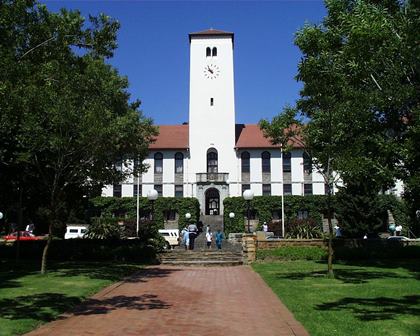Rhodes University students studying Applied Drama and Theatre put the community engagement to
its test on Saturday, 12 May 2018. In real time, at the National English Literary Museum (NELM), the
memory of a time in history, written in a play Sophiatown was returned to. Nine students facilitated
a workshop for more than fifty Nombulelo Secondary School grade 11 learners. Sophiatown is a
prescribed setwork for English First Additional Language. It is written by the Junction Theatre Avenue and the students applied their theatrical skills and techniques to teach and learn about Sophiatown (the place and play), “creating a teaching environment that was not judgmental but encouraged shared and
substantiated opinions” shares one of the students, Sboniso Thombeni.
Within no time, the NELM spaces were abuzz with Sophiatown music like “ons dak nie, ons phola hier”, Three groups of the Nombulelo Secondary School learners were swinging, Kofifi style. One was in the auditorium stage, the other one in the activity room, and the last group was in the foyer. What was missing was the 1950s attire. The NELM spaces were Sophiatown Mamariti’s shebeen as the learners, and the facilitators were all ‘drunk’ just by the music, as the old isiXhosa adage, amanxil’engoma. There was no time and need for defiance. There were no longer forced removals.
Theatre practitioners are soldiers of a different kind. Their weaponry is their craft. They do not shoot
to kill, but to disrupt the ‘known’, like magicians, the drama students’ spell hogged along, Nombulelo
Secondary School learners obliging. The whirlwind journey around the dramatic world saw learners
unpacking key aspects of the play. In the process discoveries such as historical connections between
Johannesburg Sophiatown as well Fingo village in Grahamstown were made. Sophiatown was a
cultural hub where black writers, musicians and intellectuals lived. It was also a place where black
people could own land. Accordingly, themes such as race, music, identity, relationships, politics and
apartheid were explored.
Amidst games, music and laughter, learners gained invaluable insights about the play and were even
encouraged to “self- publish books”, a strategy which facilitators used to assess learner knowledge
about the subject matter. In an imagined “praise” for “self-published books”, one notable national
leader commented, “a very inspiring book, detailed and historical”, while another student
Nompumelelo Kubheka’s book was reviewed by a grade 11 learner who said the book was an
“excellent analysis of characters”.
was time to wake up from the nearly three-hour fantasy, just before noon. It was reflection time.
You could feel the passion, admiration and adornment as the learners commented. It was a wish
that education could be this way, easy and fun. One learner shared in the feedback that they learnt
“lots of things and this was a good idea of learning not sitting on the desk and read notes.”
Phumelele Nkomozake, one of the students who facilitated posits that as a discipline, Applied Drama
“transgresses and disrupts learning anywhere, in this case in the classroom.” Another student,
Silence Annushka also majoring in Psychology said that the interaction with the learners validated
her vocation; to teach, adding that the learner’s “freshness, the new ideas and responses really
makes me excited to teach and learn more at the same time”. Head of Isikhumbuzo Applied History
Unit Professor Julia Wells said she was not surprised by the positive feedback the students received
from the learners, because “the learners seemed quite engaged” adding that if more digging about
history could be done, a discovery could be made, here in Grahamstown, of places similar to
Sophiatown.
Through the facilitation of the Drama department head, Heike Gehring, earlier in the week, the same
applied drama students facilitated the same play to learners at the Eastern Cape Schools Festival.
Within a week, they have been able to reach more than 120 learners in Sarah Bartman District.
Bravo to the nine courageous students; Nompumelelo Kubheka, Malika Maharaj, Vuyani Mayekiso,
Siphisihle Ndaba, Phumelele Nkomozake, Takalani Ralephata, Annushka Silence, Sboniso Thombeni
and Manoko Tlhako.



